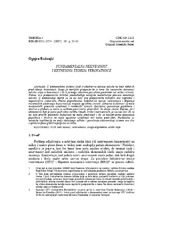Приказ основних података о документу
Fundamentalna neizvesnost i Keynesova teorija verovatnoće
Fundamental uncertainty and Keynes' probability theory
| dc.creator | Radonjić, Ognjen | |
| dc.date.accessioned | 2021-10-12T10:44:42Z | |
| dc.date.available | 2021-10-12T10:44:42Z | |
| dc.date.issued | 2007 | |
| dc.identifier.issn | 0351-2274 | |
| dc.identifier.uri | http://reff.f.bg.ac.rs/handle/123456789/671 | |
| dc.description.abstract | U ekonomskom sistemu ljudi svakodnevno donose odluke na bazi njihovih predviđanja budućnosti, Stoga je teorijska pretpostavka o tome šta racionalni donosioci odluka znaju o budućnosti i da li je mogu relativno pouzdano predvideti od velike važnosti. Naime, ova pretpostavka kritično predodređuje teorijsko modeliranje procesa donošenja odluka. U ekonomskoj teoriji su se na bazi ove pretpostavke izdvojila dva suprotna i nepomirljiva stanovišta. Prema pripadnicima Subjektivne teorije verovatnoće i Hipoteze racionalnih očekivanja budućnost je moguće egzaktno utvrditi, odnosno budućnost se može matematički precizno izračunati i numerički izraziti. Dosledno, ponašanje pojedinca i društva u globalu se može sa velikom preciznošću predvideti. Sa druge strane, Keynes, prvi ekonomista koji je jasno podvukao razliku između rizika i neizvesnosti, je zauzeo stav da se na bazi prošlih podataka budućnost ne može predvideti i da se konsekventno ponašanje pojedinca i društva ne može egzaktno izračunati niti tačno predvideti. Posledično su teorijske implikacije na polju donošenja odluka i ponašanja ekonomskog sistema ova dva suprotstavljena gledišta potpuno različite. | sr |
| dc.description.abstract | Within economic system agents daily make decisions. Those decisions are based on their expectations regarding future. Therefore, theoretical assumption about what do rational decision-makers really know about future and could agents make relatively reliable forecasts has colossal importance. Namely this assumption critically determines theoretical modeling of decision-making process. In economic theory we can make distinction between two opposite and irreconcilable standpoints on this issue. According to proponents of the Subjective Probability and the Rational Expectations Hypothesis future can be predicted exactly, that is, agents are able to mathematically calculate future precisely and to express it in terms of numbers. Consistently behavior of individual agent and society in aggregate can be predicted with great precision. On the other hand, Keynes, first economist who made clear distinction between risk and uncertainty, argued that past experiences and statistical analysis of past data were not reliable guide to future and that behavior of individual agents and society in aggregate could not be neither calculated exactly nor precisely predicted. Consequently, theoretical implications regarding decision-making and behavior of aggregate economic system of the two opposite standpoints are completely different. | en |
| dc.publisher | Srpsko filozofsko društvo, Beograd | |
| dc.relation | info:eu-repo/grantAgreement/MESTD/MPN2006-2010/149005/RS// | |
| dc.rights | openAccess | |
| dc.source | Theoria | |
| dc.subject | verovatnoća | sr |
| dc.subject | snaga argumenta | sr |
| dc.subject | rizik | sr |
| dc.subject | očekivanja | sr |
| dc.subject | neizvesnost | sr |
| dc.subject | uncertainty | en |
| dc.subject | the weight of argument | en |
| dc.subject | risk | en |
| dc.subject | probability | en |
| dc.subject | expectations | en |
| dc.title | Fundamentalna neizvesnost i Keynesova teorija verovatnoće | sr |
| dc.title | Fundamental uncertainty and Keynes' probability theory | en |
| dc.type | article | |
| dc.rights.license | ARR | |
| dc.citation.epage | 55 | |
| dc.citation.issue | 4 | |
| dc.citation.other | 50(4): 35-55 | |
| dc.citation.spage | 35 | |
| dc.citation.volume | 50 | |
| dc.identifier.fulltext | http://reff.f.bg.ac.rs/bitstream/id/2200/668.pdf | |
| dc.identifier.rcub | https://hdl.handle.net/21.15107/rcub_reff_671 | |
| dc.type.version | publishedVersion |

